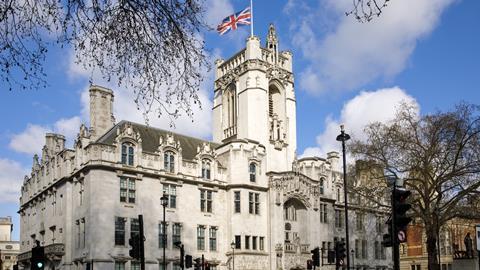A suspected fraudster can spend frozen assets on reasonable legal expenses in civil proceedings ahead of a criminal trial over an alleged £15.25m Ponzi scheme, the Supreme Court ruled today.
The Proceeds of Crime Act 2002 (POCA) does not preclude ‘an exception for legal expenses in respect of civil proceedings’ where that case is brought in relation to ‘the same or similar allegations, alleged facts and/or evidence as those of the offence(s) … which gave rise to the making of the restraint order’, the UK’s highest court held.
Independent financial adviser Andrew Luckhurst, 71, was sued by investors in his financial services business in 2016 and made subject to a £2.71m worldwide freezing order, which was discharged after part of the civil proceedings settled the following year.
Police were already investigating the alleged fraud and the Crown Prosecution Service obtained a restraint order under the POCA against Luckhurst’s assets shortly after the freezing order was discharged. Luckhurst applied to vary the order to be able to spend, among other things, £3,000 on legal advice in the civil proceedings, which was initially refused.
But his appeal was allowed by the Court of Appeal, which ruled that section 41(4) of POCA ‘provides no bar to permitting reasonable legal expenditure in civil proceedings merely because they engage in whole or in part the same factual inquiry as will be engaged in the trial of the offence which gives rise to the restraint order’.
The Supreme Court unanimously rejected an appeal by the CPS today, with Lord Burrows saying that ‘it is clear that the pursuit of the policy of maximising confiscation is qualified by the need to ensure that restraint orders do not unfairly prevent the (alleged) criminal incurring reasonable expenses of certain kinds’.
‘The policy of the restraint order provisions is not simply one of ensuring maximum confiscation,’ he added. ‘It is not in dispute, therefore, that legal expenses that are very clearly unrelated to any criminal offence – for example, where the (alleged) criminal seeks to incur the legal expenses of a divorce or of a dispute concerning a party wall – may be allowed even though this will inevitably cut down the amount of benefit available for confiscation.
‘The general purpose or policy of the restraint order provisions is therefore one of balancing the goal of ensuring confiscation with the need to ensure that the (alleged) criminal can incur certain kinds of expense.’
The judge concluded that ‘legal expenses in respect of civil proceedings for causes of action (such as for torts or equitable wrongs) are not precluded but are controlled by the courts’ discretion in the same way as, for example, living expenses’.
Jeremy Lederman, an expert in civil fraud and freezing orders at boutique firm Harold Benjamin, commented: 'Yesterday's [ruling] brings some clarity in fraud cases involving criminal and civil proceedings. In cases such as this there is always a balance to be achieved between the conflicting rights of a defendant to access frozen funds to pay legal fees to deal with civil proceedings, even those arising out of the same facts as regards the criminal proceedings, versus victims' rights to be properly compensated.
'The Supreme Court yesterday clarified 'that the pursuit of the policy of maximising confiscation is qualified by the need to ensure that restraint orders do not unfairly prevent the (alleged) criminal incurring reasonable expenses of certain kinds'... and stressed that policy of restraint order provisions is not simply one of ensuring maximum confiscation. The court accordingly ruled that reasonable legal costs of civil proceedings could be accessed from frozen assets subject to the court’s discretion.'



























